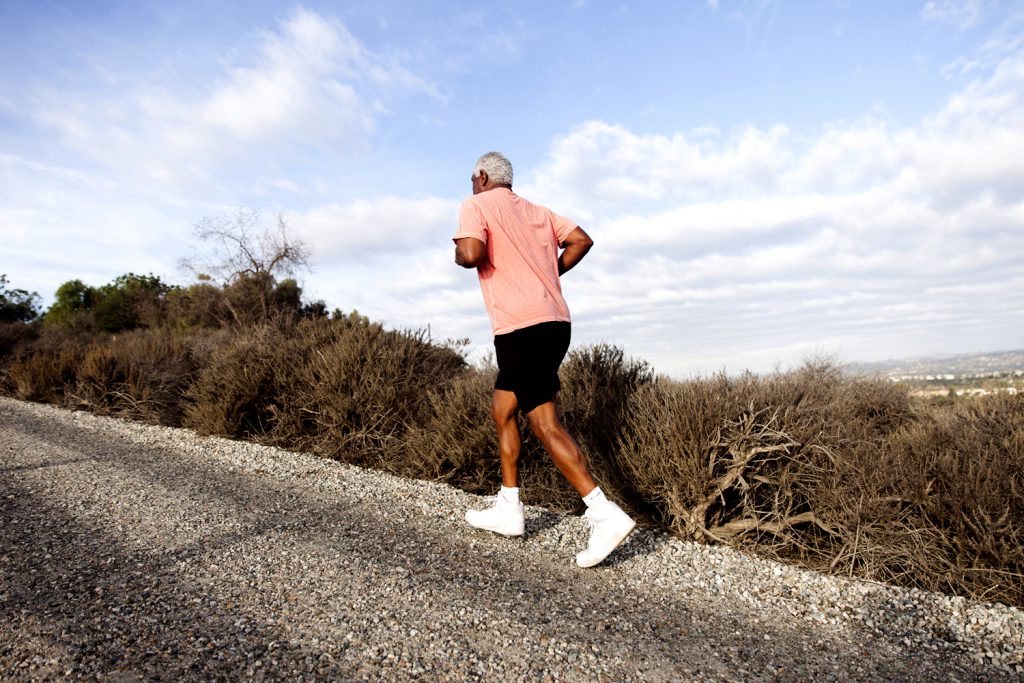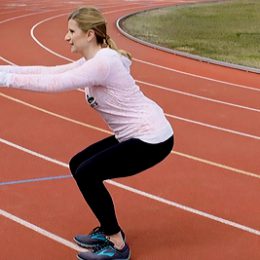The 30-Minute Interval Walk: Level 2
Are you ready for a heart-pumping, high-energy walk? If you’ve been walking with us for the first few weeks of the SilverSneakers Million Pound Challenge, you’re more than ready! (And if you happen to be starting today, feel free to jump right in.)
Today’s workout is the second level of our 30-minute interval walk. In level 1, you did one minute of fast walking and four minutes of moderate walking. In level 2, you’ll alternate between one minute of fast walking and three minutes of brisk walking.

“Interval training boosts metabolism and burns more belly fat than steady-state training,” says Michele Stanten, SilverSneakers fitness expert and author of Walk Off Weight. In other words, you’ll burn more calories with every step!
Remember: Safety first. If you’re walking outside and listening to our guided audio walk, keep the volume low or use only one earbud. If you’re on a treadmill at the gym, don’t forget to use the safety clip. If you start to feel nauseous or dizzy at any point, ease up or stop. And always drink plenty of water before, during, and after exercising.
Below is a preview of today’s walk that you can listen to in the player above or download at the link below. Use the step rate ranges in steps per minute (spm) and descriptions below to monitor your pace and intensity.
Warmup
Time: 0:00–3:00
Step Rate: 110–115 spm
Walk casually. Your arms can remain at your sides, and it’s easy to carry on a conversation. Warming up is important when you’re doing intervals, because your muscles need more blood and oxygen to meet the demands of the workout.
Moderate Walk
Time: 3:00–4:00
Step Rate: 120–125 spm
Pick up the pace. You should be able to talk, but it’s getting more difficult.
Brisk Walk
Time: 4:00–5:00
Step Rate: 130–135 spm
Bend your arms to go faster. Take quick, short steps. Don’t go too fast, though, or you’ll peter out before you get to the fast interval.
Fast Walk
Time: 5:00–6:00
Step Rate: 140–145 spm
Now you’re moving. You’re pushing yourself, but you’re able to speak in short sentences or phrases.
Brisk Walk
Time: 6:00–9:00
Step Rate: 130–135 spm
Relax, slow down, and catch your breath.
Fast Walk
Time: 9:00–10:00
Step Rate: 140–145 spm
Pump your arms forward and back. Really push yourself. Count your steps this time.
Brisk Walk
Time: 10:00–13:00
Step Rate: 130–135 spm
Slow down again to catch your breath.
Fast Walk
Time: 13:00–14:00
Step Rate: 140–145 spm
Count your steps again. Try to get a higher number. Pump your arms harder or take shorter steps to speed up.
Brisk Walk
Time: 14:00—17:00
Step Rate: 130–135 spm
Slow down. Relax. You’re halfway home.
Fast Walk
Time: 17:00–18:00
Step Rate: 140–145 spm
Get moving again! Count your steps. Go for a personal best.
Brisk Walk
Time: 18:00–21:00
Step Rate: 130–135 spm
Subscribe to our newsletter
It's quick and easy. You could be one of the 13 million people who are eligible.
Already a member? Click to discover our 15,000+ participating locations.
Follow Us
Back down to a brisk pace. Catch your breath. Reach your arms above your head, and do a couple of stretches.
Fast Walk
Time: 21:00–22:00
Step Rate: 140–145 spm
Pedal to the metal again. You’re probably feeling a burning sensation in your legs and glutes at this point. This is good—it means your workout is working.
Brisk Walk
Time: 22:00–25:00
Step Rate: 130–135 spm
Slow down, and catch your breath before the last fast interval.
Fast Walk
Time: 25:00–26:00
Step Rate: 140–145 spm
Last one—don’t leave anything in the tank. Try to get your highest step count.
Brisk Walk
Time: 26:00–28:00
Step Rate: 130–135 spm
Take two minutes to catch your breath.
Cooldown
Time: 28:00–30:00
Step Rate: 110–115 spm
Ease back to a leisurely stroll. Cooling down is great for your muscles–you’ll feel less stiff and sore later than if you stop abruptly. After your walk, you may want to loosen up with these five stretches. Great job!
Note: The exercises in this workout may be different or more advanced than those you’ll experience in a SilverSneakers class. Please consult your physician before beginning a physical activity program to make sure it’s safe for you.
 Download Audio
Download Audio


